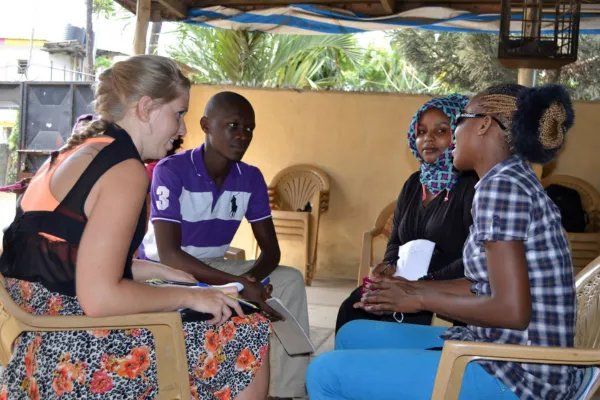
Volunteer Experience at Kwacha
My journey with Kwacha Afrika began in 2011 when I visited Mombasa, Kenya, to collect data for my Master's research. I spent five memorable months learning alongside women who had recently been diagnosed as HIV-positive, exploring their experiences and conversations around health and wellbeing. From my first day, Kasena, Kwacha Afrika’s dedicated director, welcomed me into the community and arranged a homestay with Kai Kai and her family.

Living with Kai Kai and her family offered me a glimpse into daily life significantly different from my own. Cooking meals daily on the jiko, enjoying incredible local cuisine, and immersing myself in vibrant music and culture were genuine highlights. Kai Kai's family owned a nearby small restaurant where Kai Kai worked, which became a second home to me. I particularly value the experience of cooking with Kai Kai’s mother, who taught me to make chapati and maharagwe ya nazi (coconut beans)—dishes I still try to recreate annually, although they never quite taste the same without the traditional jiko cooking method.
Together with the women at Kwacha Afrika, we formed a support group to openly discuss health issues, share accurate health information, and create a safe space for mutual support. This group continued for several years afterward, led by dedicated female volunteers from the organisation. Additionally, inspired by the community's enthusiasm, we started yoga and running groups, and I am pleased to know yoga continues to be a part of some volunteers' professional and personal lives today.

Kwacha Afrika significantly impacted my life through the relationships I formed there. It was where I first met my husband, although our relationship started purely as friends and colleagues, remaining so for seven years before we began dating. This friendship is one example among several meaningful connections established at Kwacha, including friendships with people from Ireland and New Zealand whom I have visited since. Kasena and the team generously introduced us to the sights around Mombasa, Bamburi, and Nyali, enhancing my experience further.

In 2015, I returned to Kwacha Afrika for nine months to undertake PhD research, collaborating closely with the community on a participatory action research project. Our work was significantly enriched by Dr Utheri Kanayo, a respected cultural educator, Rhodes Scholar, and former lecturer at Cambridge University. Together with an engaged team—including Karen, my lead research assistant and valued friend—we investigated intergenerational communication around sexual health. Our research identified a clear community need for mentorship spaces facilitating open conversations across generations, which Kwacha Afrika actively supported afterwards through their ongoing activism.
A very special thanks to one person who made that year adventurous, challenged me, and educated me more about living in Mombasa than I could have hoped for. Here is a little tribute I wrote to Karen published in my thesis:
Karen, I can never say enough about you, my Kenyan sister. You are one incredibly fiery young woman, with unparalleled gumption. I cannot thank you enough for your dedication to seeing this project through (during and after my presence in Kenya). Your passion about community issues, despite how daunting this work sometimes was, whilst also struggling to maintain balance with your career, family, and health, was always a strong source of motivation, helping to stoke my own fire. Staying up late drinking tea and laughing until our stomachs ached, listening to you complain about the lack of salt in my cooking, rooftop sunsets, beach walks, and doubling up on our boda-boda journeys, singing all the way to Mwakirunge are among my favourite memories from Kenya. Thank you for your beautiful friendship.
My experiences with Kwacha Afrika have deeply influenced my personal growth and professional path. The collaborations formed there have significantly shaped my career, guiding my continued exploration into community health and communication.It’s lovely to still be. Able to return and do research alongside the people working at Kwacha, who lead out important community-level change work every day. Kwacha Afrika's commitment to nurturing meaningful community connections, fostering open intergenerational dialogue, and genuinely centering local voices make it an exceptional place for anyone passionate about community-driven change and social activism.